Tom's Guide Verdict
The TurboAnt Thunder T1 is a solid upright, fat-tire ebike that can take on rough city streets and gravel rural roads.
Pros
- +
Balanced handling
- +
Pedal assist and full-throttle modes
- +
Competitive price
Cons
- -
Inaccurate battery indicator
- -
Meager mechanical bell
Why you can trust Tom's Guide
Battery: 672 Wh
Max estimated range: 60 miles
Max speed: 28 mph
Motor: 750W, 48V brushless rear hub motor
Gearing: Shimano 7-speed rear derailleur
Wheel diameter: 26 inches
Weight: 72.8 lbs.
More of a street tough than a sedate suburbanite, the TurboAnt Thunder T1 is squarely situated in the (very) crowded camp of fat-tire ebikes designed to handle rough and ready commuting chores, as well as weekend trail rides. It's priced competitively against the likes of Rad Power, Biktrix, and Aventon, but it also lacks some of the design embellishments offered by the later two brands.
Among the best electric bikes, there's a welter of basic-black, knobby-tired models on the market. They’re are a staple of messengers and delivery people, and they tend to offer basic but sturdy transportation. With pedal assist and full-throttle modes, the TurboAnt T1 is cut from the same cloth and delivers solid value for those looking to switch from four to two wheels for their daily mobility needs. Read our full TurboAnt Thunder T1 review to find out if this is the best model for you.
TurboAnt Thunder T1 Ebike review: Pricing and availability
TurboAnt offers a limited line of electric bikes and scooters direct to consumers online. There are four ebike models in all, including the T1, which starts at $1,699.
For about $150 more, the TurboAnt N1 is almost identical to the T1 but with a sleeker design that incorporates the battery into its down tube. It also uses a slightly different controller.
If you don't plan on hitting any trails and just want a suburban commuter, there's the TurboAnt Ranger, which costs about $400 less than the T1. The Ranger has a less powerful motor, smaller battery, and road bike tires, but it also weighs 20 pounds less than the T1. If you want more portability, the TurboAnt Swift S1 is a 20-inch-wheeled foldable model available for about $100 more than the T1.
Shoppers don't need to be reminded that as with many other consumer goods, supply chain issues have affected the price of ebikes, which had been trending downward. But not so much any more. So the TurboAnt Thunder T1 is something of an anomaly, managing to maintain its lower $1,699 price tag where others have risen to just under $2,000.
If you use the code TMG700 at checkout, you can receive $700 off the price of the T1.
Get instant access to breaking news, the hottest reviews, great deals and helpful tips.
TurboAnt Thunder T1 Ebike review: Design
The T1 is a straight-ahead bike with straight handle bars and an upright riding stance. It's based on an aluminum alloy frame with a front hydraulic shock absorbing fork, a wide foam seat, 7.1-inch disc brakes, and 7-speed Shimano rear derailleur.
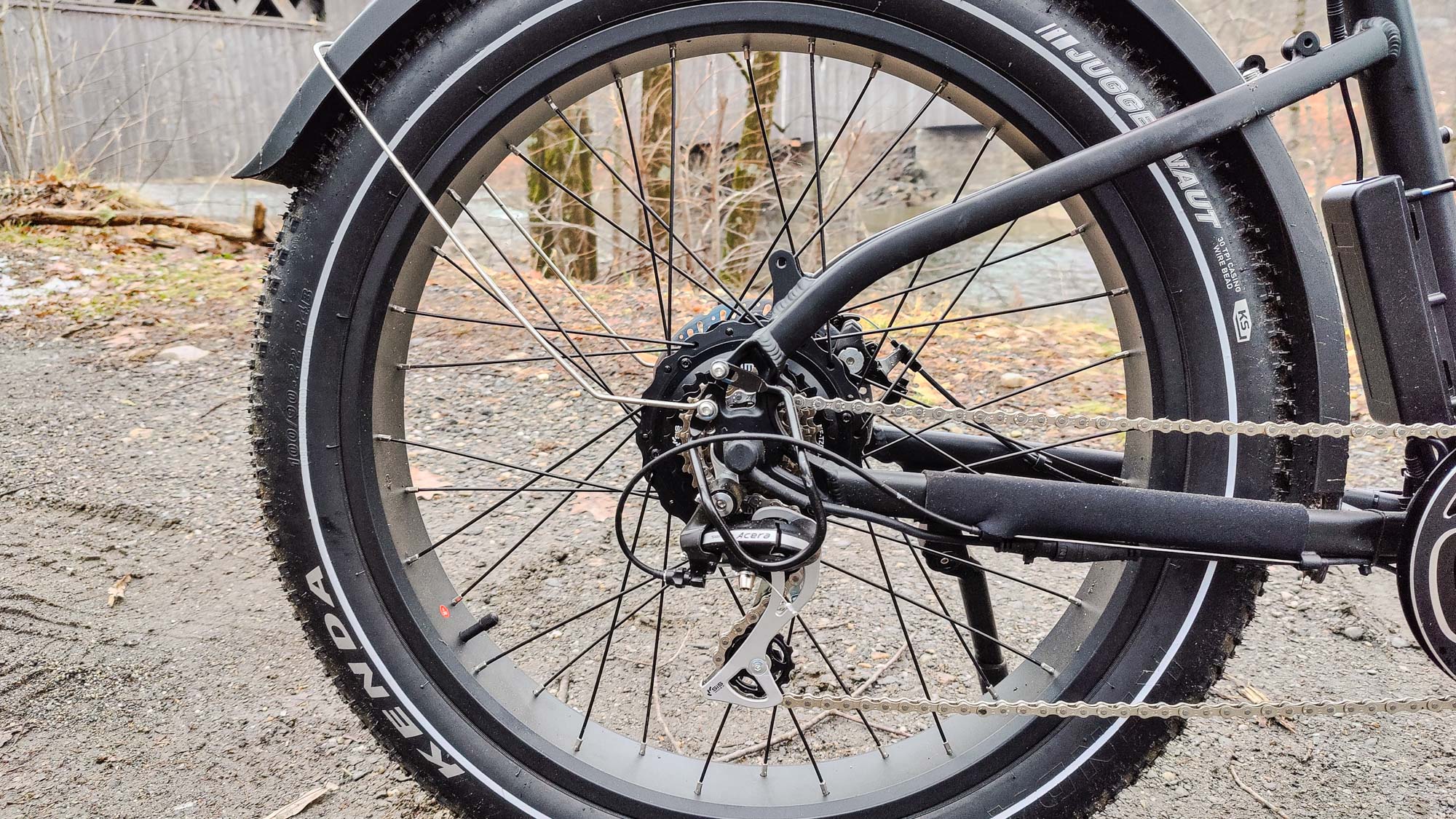
Full-length fenders to keep the mud off your khakis are standard, as are front and rear lights. The whole package rides along atop a pair of 26-by-4 inch knobby Kenda tires.
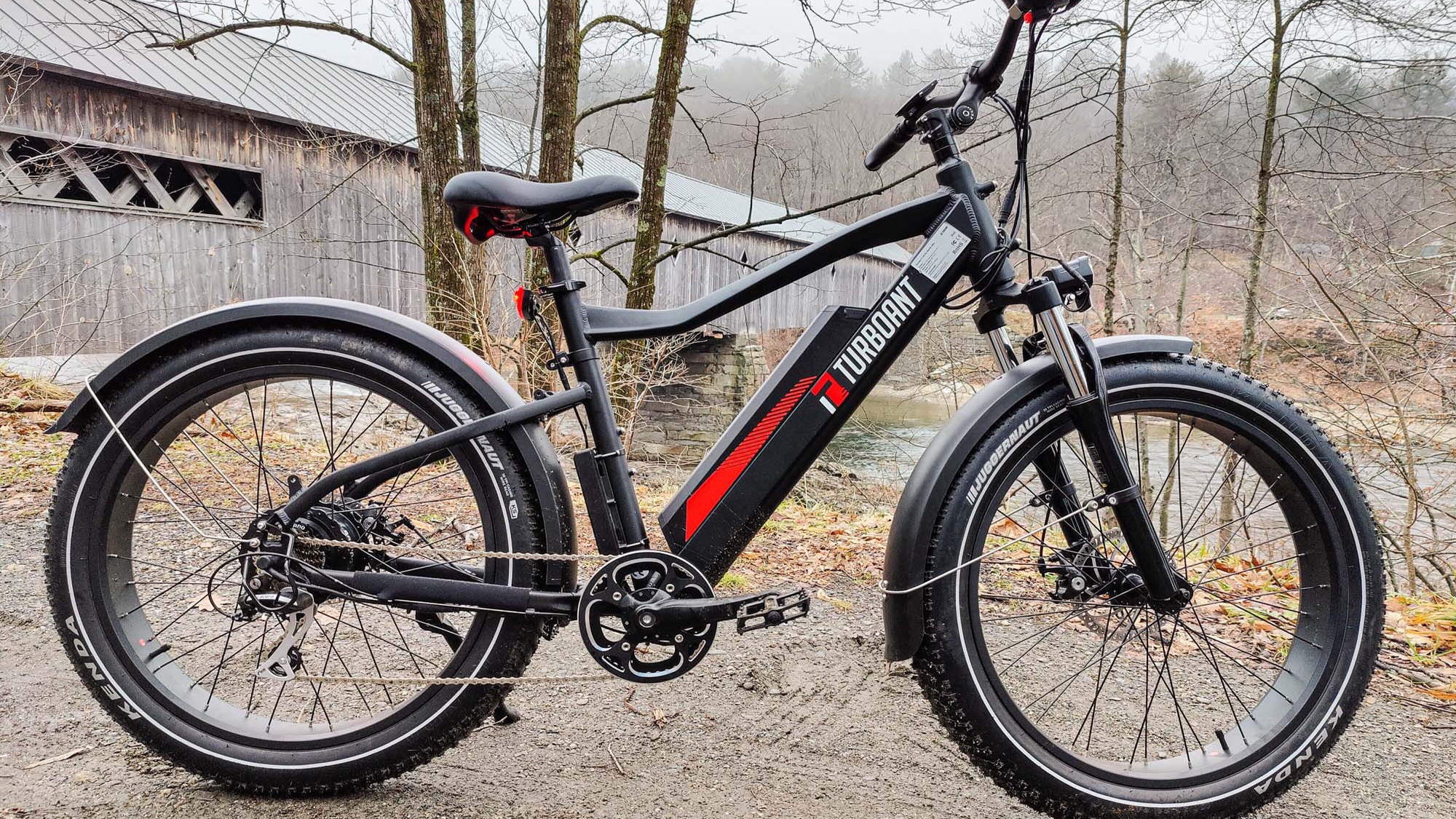
The Thunder T1's electrical components include a rear hub 750-watt Bafang motor (pretty typical for this class of ebike) and a rechargeable 672 wh battery. It's all under the command of a rather basic handle-bar mounted controller. Its monochrome LCD delivers basic information including the battery level, power assist mode, odometer, mph, and headlight indicator. There are five basic power assist modes, and for full-electric power, there's a right-hand twist throttle. Lest you turn it inadvertently, TurboAnt wisely added a red lock-out button so that you don't suddenly find yourself shooting off the trail.
TurboAnt Thunder T1 Ebike review: Performance
We gave the T1 a run for its money in a variety of conditions ranging from dusty warm autumnal days to snow-and-ice winter afternoons. The ebike handled it all with aplomb and never gave us cause to fear we'd land in the ditch when we pushed the bike to its limits. And while it tips the scales on the heavy side--nearly 73 pounds--it was even steady across some rather challenging icy patches.
According to TurboAnt's ratings, the T1 only does a maximum of 20 mph in full throttle mode. But the company notes it can exceed those speeds — up to 28 mph- — in the pedal assist mode. We weren't able to achieve the top speed (maybe we weren't trying hard enough), but we went well in excess of 20 mph on downhills and the bike stayed steady on muddy and rutted dirt roads.
The Thunder T1 also zoomed across snow and ice without fear. The ebike's flat wide handlebars provide comfortable control over the bike's direction, and in panic breaking, it slides sternly but predictably.
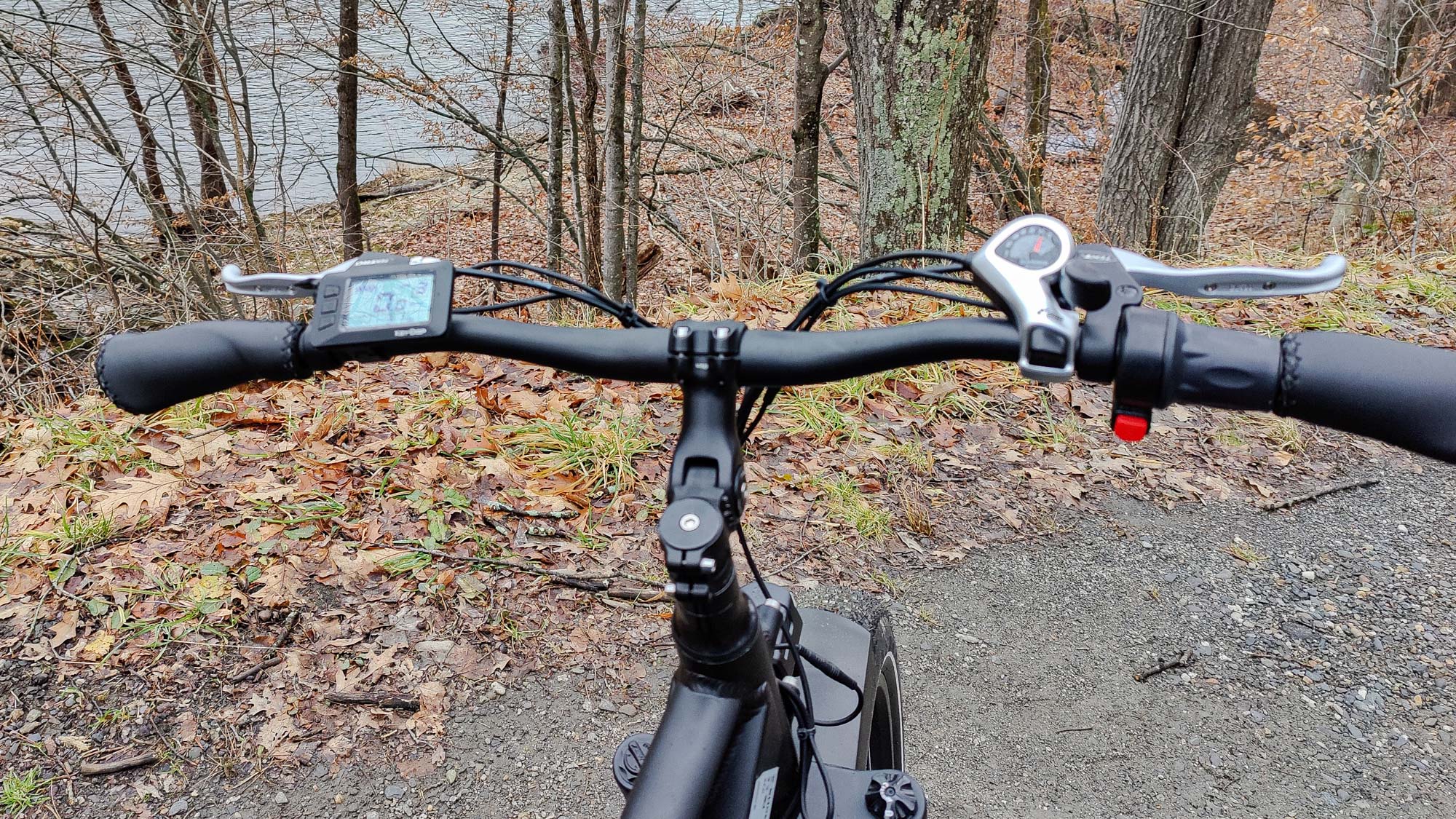
The bike's front suspension fork took some of the vibration out of stretches of washboard and even though there's no special suspension on the rear end, the Thunder T1's ride wasn't excessively severe on potholes or broken pavement.

When using the pedal assist modes, there's a slight turbo lag as there is with most rear-hub motor designs; it takes about half a pedal rotation from a standing start before you feel the boost. However, we found it was smoother in power delivery than say the Aventon Aventure. On the other hand, it did bog down going uphill; on the steepest inclines, it could only maintain about 9 mph, whereas others, like the Aventure and Biktrix Stunner, were able to keep it going at around 14 mph. Still, the TurboAnt T1 was still a solid performer on steeper grades compared to some modest commuter ebikes, such as Trek's Verve+ or Gazelle's Ultimate 380.
Of course, if you want to jump right off the line, the Thunder T1's throttle for full electric power will do that for you. It certainly helps when you've stopped on a hill at a light and just don't feel like getting out of the seat to get the bike rolling.

Also welcome are the front and rear lights. The headlight provides decent visibility; more important, the rear red light increases in brightness when you hit the brakes. The only piece we felt fell short was the meager mechanical bell, which is insufficient for urban environs. A good rechargeable bike horn will set you back about $15.
TurboAnt Thunder T1 Ebike review: Battery life and range
TurboAnt's T1 comes with a 672 Wh lithium ion battery strapped to its down tube. It's comparable in size to others in this class, and the range you'll receive depends on how much assistance you crank up and how often you resort to full-throttle mode.
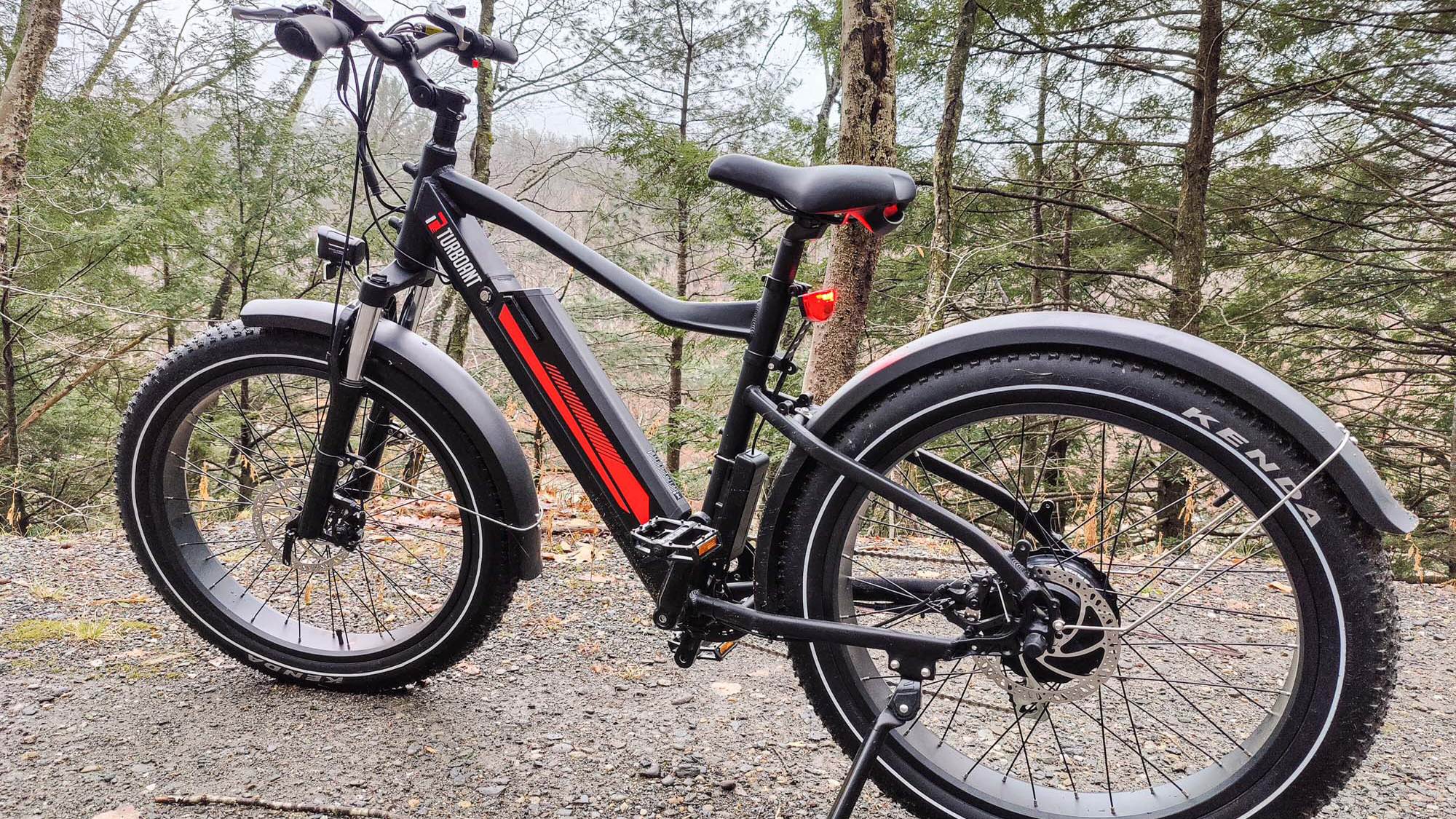
The company rates the battery for a maximum range of 60 miles. That's overly optimistic; it all depends on how fast you're going, where you're going, and how much you weigh. Unfortunately, the T1's controller does a rather poor job gauging battery life. A quick 4-mile road trip to my rural mail box seemed to drain the battery quickly; according to the display there was only about 30 percent of battery power left.
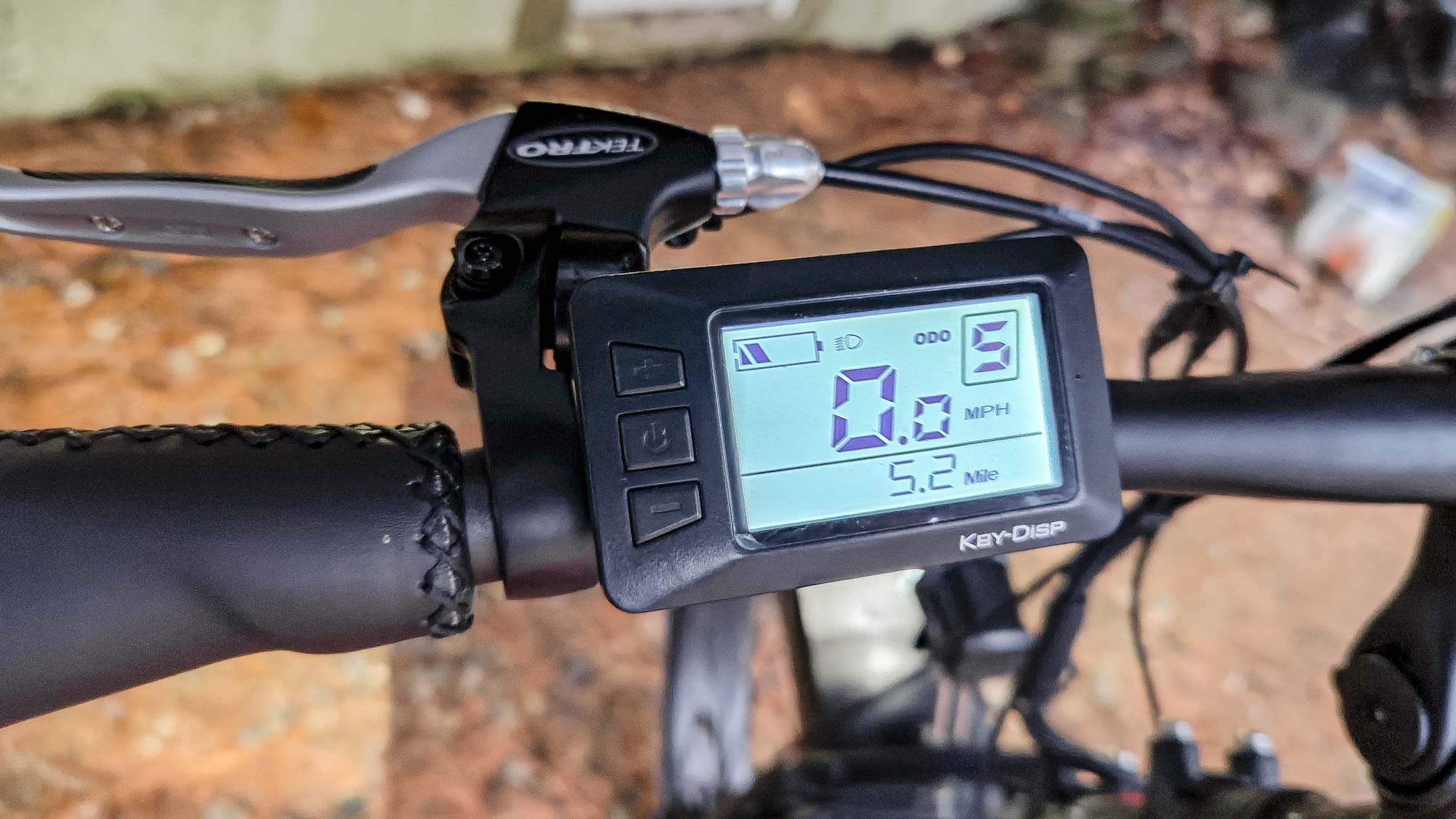
However, that thankfully turned out to be incorrect. With a lot of pedal assist and a lot of throttle use, I typically got around 28 miles of range, not atypical for models with this motor and battery combination. But if you want to know what you have left, you'll have to estimate it on your own by guessing how aggressive you've been with the assist and how far you've traveled. The display's battery indicator isn't going to be much help.
One additional note: the battery is removable and can be charged off of the bike. It’s definitely convenient for those who overnight their bikes in an apartment storage room and need to be able to take the battery with them to charge.
TurboAnt T1 Ebike review: Competition
In a category crowded with knock-off fat tire bikes, the TurboAnt Thunder T1 distinguishes itself as reliable, rough road ready transportation with components that aren't going to break down after just a few weeks use. However, to maintain its lower price point, it doesn't have the bigger battery that, say, Aventon's Aventure possesses (672 vs. 750 Wh), so you don't get quite the mountain trail climbing power of some more expensive models.
Most of the fat-tire ebikes also pack 750 watt rear hub motors with 672 Wh batteries, such as the Rad Power Radrover 6. However, Rad Power's model feels like a tighter ride, and it has much better controllers and displays that accurately deliver a raft of information yet are easy to navigate. But for those improvements, you'll pay about $300 more for the Rad Power model versus TurboAnt's T1. And that comparison extends to many other models in terms of price vs. features.
If you are thinking about spending a few hundred dollars more, consider the aforementioned Aventon Aventure. For just under $2,000, it includes an excellent controller, slicker frame design, and the larger 750 Wh battery.
TurboAnt T1 Ebike review: Bottom line
If you're looking for a fat-tire ebike for tough city streets or some weekend dirt road fun, the TurboAnt T1 can handle both. It's a balanced, predictable ride that won't throw any sudden surprises at you. And at this price, it's hundreds less than much of the competition.
On the other hand, if you are looking for sleek tech to support the bike, like connected apps and a full-color display for the controller, you won't find that here. But at its lower price than other fat tire ebikes, that may be a tradeoff you’re willing to make.
John R. Quain has been reviewing and testing video and audio equipment for more than 20 years. For Tom's Guide, he has reviewed televisions, HDTV antennas, electric bikes, electric cars, as well as other outdoor equipment. He is currently a contributor to The New York Times and the CBS News television program.







